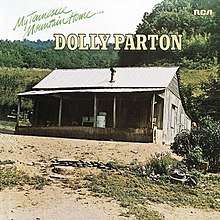My Tennessee Mountain Home
My Tennessee Mountain Home is the eleventh solo studio album by Dolly Parton. It was released on April 2, 1973, by RCA Victor. The house pictured on the album cover was the house in which the Parton family lived during the late 1940s and early 1950s.
| My Tennessee Mountain Home | ||||
|---|---|---|---|---|
 | ||||
| Studio album by | ||||
| Released | April 2, 1973 | |||
| Recorded | September 1–October 3, 1972 | |||
| Studio | RCA Studio B (Nashville) | |||
| Genre | Country | |||
| Length | 31:31 | |||
| Label | RCA Victor | |||
| Producer | Bob Ferguson | |||
| Dolly Parton chronology | ||||
| ||||
| Singles from My Tennessee Mountain Home | ||||
| ||||
Content
Largely a concept album about her childhood in rural East Tennessee, the album begins with a recitation of the first letter Parton wrote to her parents shortly after moving from her hometown of Sevierville, Tennessee to Nashville in 1964. Most of the songs are fond reminiscences of her youth and family, though in one song, "In the Good Old Days (When Times Were Bad)", Parton candidly admits that though she is grateful for the lessons the poverty of her childhood taught her, she is in no hurry to repeat the experience. The final cut on the album, "Down on Music Row", recounts her first days on Nashville's Music Row, trying to get a record deal, and thanking those who helped her along the way, making specific mention of Chet Atkins and RCA's Bob Ferguson.
Reception
| Review scores | |
|---|---|
| Source | Rating |
| AllMusic | |
| Christgau's Record Guide | B+[2] |
| Music Box | |
| Pitchfork | 2.2/10[4] |
| Uncut | |
In a positive review of the album, Billboard said, "This is an autobiography, from start to finish. Telling musically what has happened in Dolly's life, her relationships with her family and friends, her career, etc. A little out of the ordinary and her devotees will love it. It even has liner notes by her parents, and a picture of her early home." They named "In the Good Old Days (When Times Were Bad)", "My Tennessee Mountain Home", and "Down on Music Row" as the best cuts on the album.[6]
Though neither the album nor the title single were huge commercial hits for Parton — neither cracked the top ten on the U.S. country singles or albums charts — they remain fondly remembered by her fans; the My Tennessee Mountain Home album is among the most critically praised albums in Parton's catalogue. The title track became one of Parton's better-known compositions.
Legacy
In later years, Parton has used the song "My Tennessee Mountain Home" as something of a theme song for her Dollywood theme park.
In 2009, "Eugene, Oregon" and Parton's original recording of "What Will Baby Be?," two outtakes from the recording sessions for this album, were released on the 4-disc, career-spanning box set "Dolly." Parton would later re-record "What Will Baby Be?" for inclusion on 1992's Slow Dancing with the Moon.
In 2010, Sony Music reissued the 2007 CD My Tennessee Mountain Home in a triple-feature CD set with Coat of Many Colors and Jolene and they have never been out of print.
Track listing
All tracks are written by Dolly Parton.
| No. | Title | Recording date | Length |
|---|---|---|---|
| 1. | "The Letter" | September 5, 1972 | 2:03 |
| 2. | "I Remember" | October 3, 1972 | 3:42 |
| 3. | "Old Black Kettle" | September 5, 1972 | 2:32 |
| 4. | "Daddy's Working Boots" | September 1, 1972 | 2:52 |
| 5. | "Dr. Robert F. Thomas" | October 2, 1972 | 2:36 |
| 6. | "In the Good Old Days (When Times were Bad)" | October 2, 1972 | 3:26 |
| No. | Title | Recording date | Length |
|---|---|---|---|
| 1. | "My Tennessee Mountain Home" | September 1, 1972 | 3:05 |
| 2. | "Wrong Direction Home" | September 1, 1972 | 2:28 |
| 3. | "Back Home" | October 3, 1972 | 2:44 |
| 4. | "The Better Part of Life" | October 3, 1972 | 3:13 |
| 5. | "Down on Music Row" | September 5, 1972 | 2:58 |
| No. | Title | Recording date | Length |
|---|---|---|---|
| 12. | "Sacred Memories" | September 1, 1972 | 2:44 |
Personnel
- Dolly Parton – vocals, guitar
- Jimmy Colvard – guitar
- Jimmy Capps – guitar
- Dave Kirby – guitar
- Bobby Thompson – guitar
- Chip Young – guitar
- Pete Drake – pedal steel guitar
- Don Warden – dobro
- Bobby Dyson – bass
- Jerry Carrigan – drums
- Buck Trent – banjo
- Mack Magaha – fiddle
- Johnny Gimble – fiddle
- Hargus "Pig" Robbins – piano
- Charlie McCoy – harmonica
- Mary Hoephinger – harp
- The Nashville Edition - background vocals
References
- Allmusic review
- Christgau, Robert (1981). "Consumer Guide '70s: P". Christgau's Record Guide: Rock Albums of the Seventies. Ticknor & Fields. ISBN 089919026X. Retrieved March 10, 2019 – via robertchristgau.com.
- Music Box review
- Wolk, Douglas (April 13, 2007). "Dolly Parton". Pitchfork. Retrieved March 10, 2019.
- Alastair McKay Uncut, May 2007, Issue 120
- "Radio Action & Pick LPs" (PDF). American Radio History. Billboard. April 14, 1973. Retrieved January 16, 2020.
External links
- My Tennessee Mountain Home at dollyon-line.com